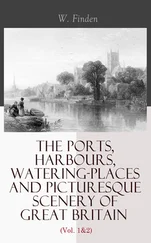Williamson, who had been given sole charge of the case, gathered several magistrates at the Trowbridge police court at eleven on Wednesday morning. The chairman, as before, was Henry Ludlow. The magistrates' clerk, Henry Clark, was also present, as were Captain Meredith, the Chief Constable of the Wiltshire police, Superintendent Harris, Joseph Stapleton and the two solicitors who had been employed by Samuel Kent in 1860, Rowland Rodway and William Dunn. The proceedings were delayed by the late arrival of a key witness, the Reverend Wagner. Hundreds of people who had not gained entry waited outside in the sun.
Wagner reached Trowbridge railway station at twelve o'clock, accompanied by Detective-Sergeant Thomas, and went straight into the court. The room was packed. He sat down, his eyes half-closed, his plump hands resting on top of his umbrella and his chin on his hands.
Constance walked 'calmly and firmly' into the courtroom, reported the Daily Telegraph . She was a stout girl of average height, according to this paper's reporter, and looked to be 'in robust health . . . her cheeks had a ruddy look which did not at all impress upon the spectators the idea that she had been a prey to an accusing conscience. For the first few minutes she looked like a person who felt herself placed in some unpleasant situation.' Miss Gream, who sat next to her, appeared rigid with nerves.
The clerk began by reading out Wagner's statement and then Ludlow, the chairman, asked Wagner: 'Is that true?' 'Yes,' he replied. Ludlow turned to Constance: 'Have you any question to ask this witness?' 'No, sir. I have not.' The magistrate turned back to Wagner: 'You may retire.'
Williamson took the stand and the clerk read out his deposition. As the confession was read to the court, Constance's composure gave way. At the word 'murdered' she burst into tears and half-fell to her knees, leaning against Miss Gream and sobbing bitterly. The Lady Superior wept alongside her. Though Constance was offered a vinaigrette - a box of smelling salts - by one woman sitting nearby and a glass of water by another, she was too agitated to accept either. When the Inspector stepped down, Ludlow told Constance that she was remanded for a week. She was taken to Devizes gaol that day.
Williamson posted a letter to Sir Richard Mayne, asking him to authorise a detective to find Elizabeth Gough, and the next day sent a telegraphic message direct to Dick Tanner, asking him to track the nursemaid down. Detective-Inspector Tanner, who had interviewed the Kents' former servant Harriet Gollop for Whicher in 1860, had become feeted for solving the North London Railway case of 1864, the first murder in England to take place on a train (he traced the killer, Franz Muller, by means of a hat found in the carriage, and chased him to New York by steamship). Though the press reported a rumour that Gough had married an Australian sheep farmer, Tanner found that she was at the family home in Isleworth, twelve miles from London. Jack Whicher, still living in Pimlico, was invited by Mayne to go with Tanner to interview the woman he had defended so fiercely, and fruitlessly, in 1860. The two discovered that she was earning a scant living as a dressmaker, occasionally employed to do needlework in gentlemen's houses for a week at a time.
Williamson, meanwhile, made inquiries in Road and in Frome, where he interviewed William Dunn and Joshua Parsons - the doctor had moved there from Beckington in 1862, and now ran a busy general practice. The Inspector returned to London on Saturday, and on Sunday visited Gough himself, taking Whicher with him.
The ex-detective and his one-time protege worked together that week. Afterwards the younger man applied for his former boss to be refunded PS5.7 s .6 d. for 'travelling and other expenses'. It was just over a year since Whicher had retired from the department, humiliated and disowned. A few newspapers referred to how unjustly he had been maligned. The Time published a letter from Lord Folkestone: 'Will you allow me to state, in justice to Detective Whicher . . . that the last words he said to a friend of mine at the time were, "Mark my words, Sir, nothing now will be known about the murder till Miss Constance Kent confesses." The Somerset and Wilts Journal reminded its readers of the 'merciless and almost universal . . . censure' to which this 'able and experienced' officer had been subjected. But the fact that Constance had confessed was not taken as a sign that the detective had triumphed; as the words on Saville's tombstone had promised, God had triumphed where man - and science, and detection - had failed.
On Monday, 1 May, Samuel Kent visited his daughter in Devizes gaol, accompanied by Rowland Rodway. Constance was sitting at a desk, writing. She stood up to greet Rodway, but on seeing her father she broke down in tears, recoiled and staggered backwards towards her bed. Samuel caught her in his arms. As the men left, Constance told her father that 'the course she had adopted was due to him and her God'.
The Standard reported that Samuel was 'completely stunned' by the meeting with his daughter: 'He walks and talks, as it were, mechanically.' He visited Constance every day that week, and arranged for the staff of the Bear Hotel in Devizes to supply her with dinners. To pass the time in prison, she read, wrote and sewed.
On Thursday Constance returned to the Trowbridge police court. The chief magistrate was Henry Ludlow and his task, as in 1860, was to establish whether there was enough evidence to send Constance for trial at a higher court. At 11 a.m. about thirty reporters rushed in through the narrow passage to the stifling courtroom and scrambled for seats. The crude bench erected for the press at the first Road murder hearings was still in place, but was not large enough for all of them; some grabbed the seats reserved for the lawyers, which prompted angry reprimands from the policemen trying to keep order. There was standing room for only a fraction of the huge crowd that had gathered outside.
Though Constance at first seemed calm, once she had taken her place in the dock 'her heaving bosom told of the tumult raging within', said the Somerset and Wilts Journal. The witnesses came and went, as they had five years earlier, repeating the little they knew: Gough, Benger, Parsons, Cox (now Sarah Rogers, having married a farmer from the Wiltshire village of Steeple Ashton), Mrs Holley, her daughter Martha (now Martha Nutt, having married one of the Nutts of Road Hill), Police Sergeant James Watts. To some, the images of the murder were still vivid - Benger recalled that when he lifted Saville's body from the privy 'blood was catched on the folds of his little night dress'. Parsons, slightly altering his conclusions of 1860, said that he thought the immediate cause of Saville's death was the incision in his throat, but that he might have been partly suffocated before it was inflicted. He repeated that it was impossible that a razor caused the wound to the chest, which could 'only have been inflicted by a long, strong, sharp-pointed knife . . . there was a notch on one side as though the knife had been withdrawn in a different direction to that which it was forced in'. He said that when he examined the nightdress on Constance's bed on 30 June 1860, he noticed that the cuffs were still stiff with starch.
After each witness had testified, Constance was asked if she had any questions to put. 'No,' she breathed. She kept her face veiled and her eyes cast down throughout the proceedings, lifting her head only to glance at a new witness or to motion an answer to a question from the chairman.
Whicher took the stand. As he gave his evidence he produced his relics: the two nightdresses he had confiscated from Constance's room five years earlier, Constance's handwritten list of linen, and the warrant issued for her arrest - he must have been waiting for this day. ('You ought to have been a detective police officer,' Lady Audley tells Robert Audley, her pursuer. He replies: 'I sometimes think I should have been a good one.' 'Why?' 'Because I am patient.') Whicher's account of his investigation at Road Hill in 1860 rehearsed, almost word for word, what he had told the magistrates then. It was as if the story had become an incantation. He expressed no emotion at the turn events had taken - no rancour, no triumph, no relief. Ludlow gave him the opportunity to make clear that the local police had concealed from him their discovery of a bloodstained shift in the boiler hole.
Читать дальше












